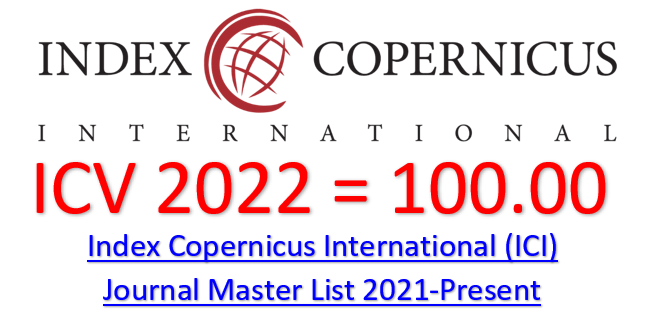Self Control Of Nomophobia During The Covid-19 Pandemic
DOI:
https://doi.org/10.55018/janh.v5i1.137Keywords:
Self Control, Nomophobia, Covid-19, Online LearningAbstract
The Covid-19 pandemic has had an impact on education which is now being carried out online (distance learning with the systemonline) withsmartphone. as a resultsmartphone excessively gives the effect of anxiety or fear when not in contact withsmartphone or so callednomophobia. In anticipation of usesmartphone excess, self-control is needed that is inherent in a person. Research objectives to find outSelf Control ToNomophobia during the Covid-19 Pandemic for Students of the D3 Nursing Study Program STIKES Karya Husada Kediri.
Descriptive research design, population of 170 respondents, sample of 63 respondents, techniquepurposive sampling, instrument with a questionnaire sheet, the research was carried out on 1-28 February 2022. The research variable wasSelf Control against Nomophobiaduring the Covid-19 Pandemic. Data were analyzed using a range of values and interpreted quantitatively.
The results of the research from 63 respondents showed that the majority of respondents 70% hadself control medium category and almost half of the respondents 30% haveself control the highest.
Self control influenced by the factors of residence, duration of smartphone playing and preferred learning techniques as well as gender.
It is expected that respondents who haveself control being to improveself control to anticipate usesmartphone excessively by way of usingsmartphone wisely and limit themselves in the use and respondents who haveself control high to maintainself control possessed to limit oneself in the effects of usesmartphone.
Downloads
References
Akhtar, F., Patel, P. K., Heyat, M. B. B., Yousaf, S., Baig, A. A., Mohona, R. A., Mutoffar, M. M., Bhattacharya, T., Teelhawod, B. N., & Li, J. P. (2023). Smartphone addiction among students and its harmful effects on mental health, oxidative stress, and neurodegeneration towards future modulation of anti-addiction therapies: a comprehensive survey based on slr, Research questions, and network visualization techniques. CNS & Neurological Disorders-Drug Targets (Formerly Current Drug Targets-CNS & Neurological Disorders), 22(7), 1070–1089.
Arora, A., Chakraborty, P., & Bhatia, M. P. S. (2021). Problematic use of digital technologies and its impact on mental health during COVID-19 pandemic: assessment using machine learning. Emerging Technologies during the Era of COVID-19 Pandemic, 197–221.
Aydin, M. K., & Kuş, M. (2023). Nomophobia and smartphone addiction amidst COVID-19 home confinement: the parallel mediating role of digital gaming and social media tools usage across secondary school students. Frontiers in Psychology, 14.
Bayrak, G., Özdemir, H., Aslan, U. B., & Yağcı, N. (2023). Does the Covid‐19 Lockdown Affect Pain and Anxiety in High School Seniors and High School Graduates Preparing for the University Exam? Psychology in the Schools.
Caponnetto, P., Inguscio, L., Valeri, S., Maglia, M., Polosa, R., Lai, C., & Mazzoni, G. (2021). Smartphone addiction across the lifetime during Italian lockdown for COVID-19. Journal of Addictive Diseases, 39(4), 441–449.
Ghulam, A. T. (2011). Patients’ Satisfaction With the Preoperative Informed Consent Procedure: A Multicenter Questionnaire Survey in Switzerland. Mayo Clinic Proceeding, 81(3), 307–312.
Kukreti, S., Ahorsu, D. K., Strong, C., Chen, I.-H., Lin, C.-Y., Ko, N.-Y., Griffiths, M. D., Chen, Y.-P., Kuo, Y.-J., & Pakpour, A. H. (2021). Post-traumatic stress disorder in Chinese teachers during COVID-19 pandemic: Roles of fear of COVID-19, nomophobia, and psychological distress. Healthcare, 9(10), 1288.
Kumar, A. R., & Thomas, S. (2020). Study on nomophobia and anger among undergraduates during COVID-19 pandemic. International Journal of Indian Psychology, 8(3), 1397–1403.
Lai, S. A., Pang, K. Y., Siau, C. S., Chan, C. M. H., Tan, Y. K., Ooi, P. B., Ridzuan, M. I. B. M., & Ho, M. C. (2022). Social support as a mediator in the relationship between perceived stress and nomophobia: An Investigation among Malaysian university students during the COVID-19 pandemic. Current Psychology, 1–8.
Murrow, D. (2020). Drowning in Screen Time: A Lifeline for Adults, Parents, Teachers, and Ministers who Want to Reclaim Their Real Lives. Salem Books.
Nguyen, B. T. N., Nguyen, T. T., & Le, U. T. T. (2022). Nomophobia and stress among Vietnamese high school students in Covid-19 pandemic: A mediation model of loneliness. Journal of Biochemical Technology, 13(1), 34–40.
Permatasari, S. K., Kamasturyani, Y., Nurfajriyani, I., & Andhini, C. S. D. (2022). Hubungan Kontrol Diri Dengan Kecenderungan Nomophobia Selama Masa Pandemi Covid-19 Pada Siswa Di SMPN 1 Kota Cirebon. Jurnal Kesehatan Mahardika, 9(1), 41–45.
Potter, P. A., Perry, A. G., Stockert, P., & Hall,
Downloads
Published
How to Cite
Issue
Section
License

This work is licensed under a Creative Commons Attribution-ShareAlike 4.0 International License.

























